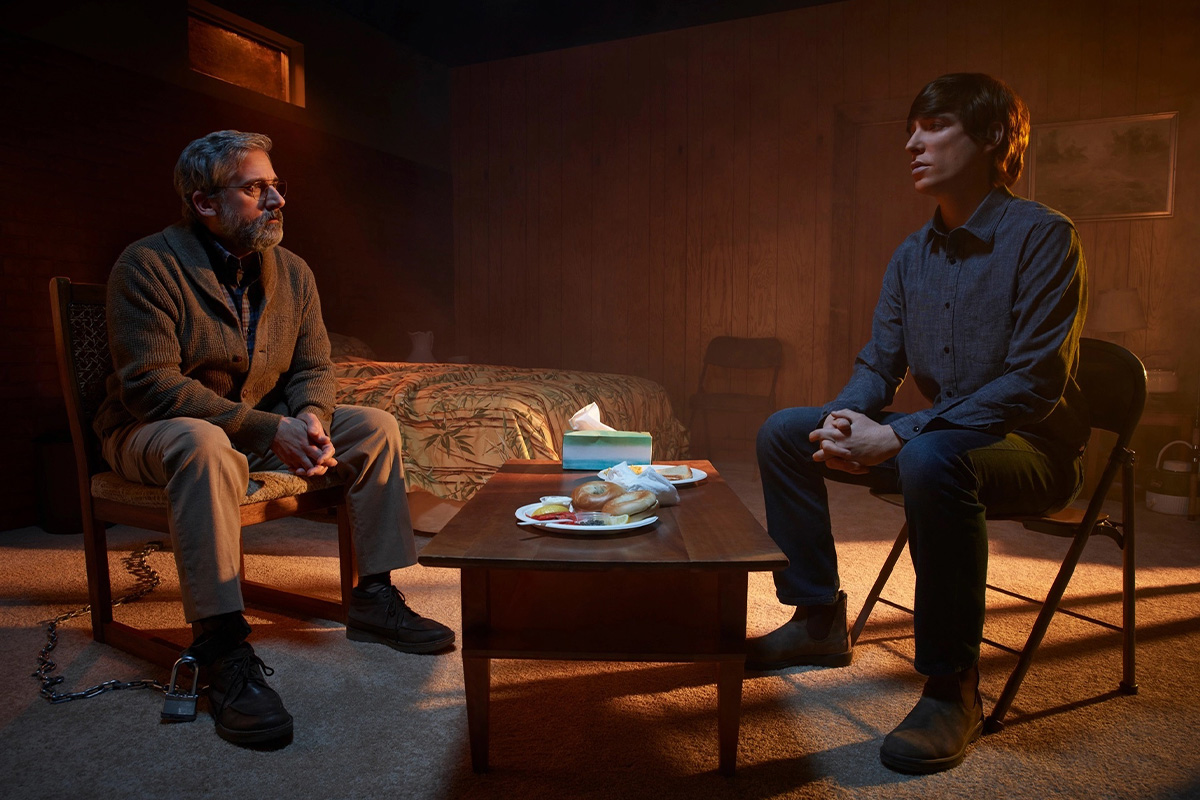Spoilers ahead for “The Patient.”
I have always suspected that the jobs of therapists and rabbis are more similar than either profession would care to admit. After all, discussion of trauma, irrational fears and strained family dynamics could be found in a Torah study group as easily as it could be in a therapy session. But never have I been so sure of these professions’ profound connection as I have after watching FX’s “The Patient,” the most Jewish show to hit the zeitgeist since “Hunters” took us all for a spin two years ago.
Co-created by FX veterans Joel Fields and Joe Weisberg, the duo behind “The Americans,” this 10-episode miniseries tracks the terrifying and shockingly rabbinical therapist-patient relationship between Alan Strauss, a Jewish therapist, and Sam Fortner, a serial killer. Alan, a well-regarded psychologist and author, is still reeling from the death of his wife and struggling to repair a strained relationship with his Orthodox son. Sam, on the other hand, is a divorced restaurant inspector living with his enabling mom. He feels profound animosity for his physically abusive father, which has left him with what he matter-of-factly describes as “a compulsion to murder.” However, the show takes pains to convey that Sam is no psychopath. He knows what he’s doing is wrong, and he wants to stop. So he does what any of us would do in this situation: kidnap his therapist and chain him to the floor of his mom’s basement.
The premise is genius, but what really makes this show a worthwhile use of five hours is the performances at its center. Sam is played by the captivating Domhnall Gleeson, who has long been one of my favorite actors in the tall and gaunt category of weird leading men. Whether bumbling in “Ex Machina,” pining in “Anna Karenina” or straight-up seething as a baddie in the most recent Star Wars trilogy, I cannot help but be drawn to this angular Irishman.
Gleeson’s grounded and often tragic performance makes it nearly impossible not to sympathize with Sam, which makes it all too easy to find a villain in Sam’s mom, played by Linda Emond. She knows about his homicidal behavior but refuses to do anything beyond timidly mumbling her displeasure. Although she is absolutely a frustrating character, the resistance of the all-too-alluring opportunity to turn her into a stereotypically monstrous mother indicates the nuance and tact with which these characters are drawn.
Since he is not chained to the floor, Sam is definitely a more active character than Alan. However, if there is a marginal protagonist in this true two-hander, Alan definitely carries more of the weight. We mostly follow his point of view, and unlike Sam’s unwavering facade, Alan’s understandably guarded exterior eventually gives way to an even thornier interior. Steve Carell takes on that responsibility with a quiet conviction that is nothing less than extraordinary. Carell has proved his range time and time again in films ranging from “Foxcatcher” to “Despicable Me,” but I still managed to be wowed by what he does with this role.
In recent years, there’s been much discussion about Hollywood’s unfortunate tendency to cast non-Jewish actors in Jewish roles. In the past, I have been a staunch member of the outraged party — but, despite my deepest wishes, Steve Carell is definitely not Jewish. While I know, for the sake of consistency, I should say that’s a bad thing, his performance as Alan is so perfect that I can’t bring myself to be even the tiniest bit disturbed by it. It is so clear that no one could have played this role with the humanity and heart-wrenching sincerity that Carell does, and if he is not heavily awarded for this gorgeous performance, I will once again be leading the outrage brigade.
By the second episode, Alan comes to terms with the fact that his best chance of surviving this ordeal is to attempt to actually treat Sam. This is where his Jewish identity begins to shift from merely incidental to crucial. He first attempts to inspire Sam to feel empathy for his victims by teaching him elements of the Jewish mourning process, from sitting shiva to saying the mourner’s kaddish. One of Sam’s more interesting characteristics, which is alluded to but never fully explored, is his impulse to learn these Jewish lessons. He mentions early on that he specifically sought out a Jewish therapist, eavesdrops on Alan praying and later, in a heartbreakingly hilarious scene, attempts to say kaddish over a victim before stumbling over the words (a deeply relatable moment) and storming away in frustration.
When Alan’s teachings fail to assuage Sam’s bloodlust, he is forced to delve deeper into Sam’s corroding hatred for his father. One fractured parent-child relationship bleeds into another as Alan examines his estrangement from his own son, Ezra. Both Alan and his late wife, a Reform cantor, feel that Ezra has abandoned them in favor of leading an inflexibly religious lifestyle. At the same time, Ezra feels unaccepted and judged for living according to his beliefs. While not all Jews have to navigate someone in their immediate family becoming Orthodox, Alan and his late wife’s struggle to accept and support their son’s differing belief is all too relatable to any Jew — and any strong-willed person, for that matter — in this moment of intense polarization.
What gives this emotional reckoning tension, though, is how we slowly uncover Alan’s pent-up resentments and disappointments along with him. In early episodes, we gradually wade into Alan’s psyche through flashbacks and fantasy sequences before finally diving into a series of imagined conversations with his dead therapist, played with gravitas by David Alan Grier. These self-therapizing reveries begin with Alan blaming Ezra for deserting their family and seeing his complaints as mere excuses to leave. Eventually, they culminate in Alan’s recognition of his own stubbornness, a quality he railed against Ezra for, and an acceptance of responsibility for his failures in their relationship.
This emotional revelation provides a nuanced look at the under-discussed intra-religion resentments and prejudices that can form between more secular and more religious members. These well-drawn conflicts and contentions within Judaism only work thanks to the detailed depiction of the Jewish life and traditions in the show. These faithful representations of a Reform guitar-led Shabbat service, an Orthodox wedding and the passive-aggressive power plays at a shared Shabbat dinner are bolstered not only by the co-creators’ life experiences as Jews, but also by an Orthodox consultant engaged by the writers.
However, there were some Jewish themes that did not work for me, notably the concentration camp nightmares that plague Alan. This motif was visually interesting and added some tension, but we never receive an answer as to why, specifically, this chilling imagery haunts him. While the Holocaust is definitely the stuff of nightmares, and it remains a major fear for many Jews today, it is usually not our primary fear — so without a deeper explanation, its invocation feels lazy.
I won’t give away the heart-wrenching and unexpected ending of the series. But if there is one thing we know for sure about mental illness, it is that it takes more than a measly 10 episodes to get better. So it’s not much of a spoiler that Alan’s forced psychoanalysis and religious instruction are not completely successful. However, his own journey to self-discovery is triumphant, proven by his last hallucination featuring his whole family happily singing around the dinner table and by a final dispatch of love to his children, begging his son’s forgiveness and blessing his way of life. He even grows to have fondness for Sam, despite what he has done to him.
So even though Jewish values are not enough to save Sam, revisiting them in an attempt to help him is enough to save Alan. Despite the general gloominess of the show, Alan’s personal growth left me feeling hopeful. In a time of immense insecurity and peril, channeling his Jewish values helps him find solace through acceptance and love. This made “The Patient” a helpful and much-needed reminder that Judaism teaches us to be generous towards everyone: your family, Jews who believe differently from you, and maybe even your serial killer captor.



